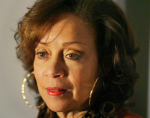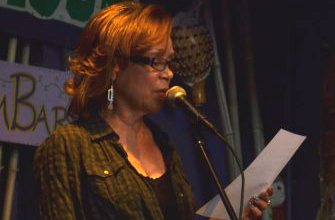A Washington, D.C. poet, Carolyn Joyner has been featured in many publications and anthologies including Obsidian, Amistad, and Beltway Quarterly poetry magazines, Gathering Ground, Beyond the Frontier, Mass Ave Review, and the 2004-2005 Cave Canem annual collections. She is a former WritersCorps and River of Words Project instructor, and was a fellow at the Virginia Center for the Creative Arts and Cave Canem. In 2010, she cohosted Poet’s Corner, a program on local D.C. radio station, WPFW, and in 2003 and 2013, she received an Artist Fellowship grant from the D.C. Commission on the Arts and Humanities. Joyner has a Master of Arts degree in creative writing from Johns Hopkins University.
“They strutted like peacocks,” she said.

Upon completion of writing poems in a workshop for displaced women, a colleague likened the pride swelling from their chests to the swagger of the glorious peafowl. I was studying to be a poet at the time, and was immediately smitten by her comparison. It not only seemed to flesh out the emotion of the women’s newfound self-respect, but awoke in me the warmth and delight she felt about it. How great to limber up the imagination enough to stir lyrical life into those who didn’t know it was there. I vowed right then that I would do my best to achieve this impact when it was my turn to lead a workshop, and when I attended one, I would expect nothing less. This was a tall order for a newcomer, and the challenge persists to this day.
When I was first invited to conduct a Saturday workshop for the CentroNía community in Washington, D.C., which is funded through the Readings & Workshops program at Poets & Writers, I was asked to identify my implementation strategy. Would the focus be on the use of visual and sensory imagery? Would it be theme-based? Understanding that this would be the least of my concerns, I settled on a “generative” workshop—one designed to generate poems.
The poetry workshops at CentroNía have always been exciting and unique. I lived in the community and had attended many. The participants are very eclectic and representative of the intergenerational, varied ethnicities and cultures of the community, writers who range from the experienced to those just trying their hand. And this was the challenge—to tailor a workshop that would address the literary needs of such a diverse group and have them leave “strutting like peacocks.”
Workshop preparation took me well beyond the usual outline of discussion and accompanying exercises. I threw myself into my own thoughts, sensations, and feelings about poetry, and moved away from placing too much importance on the distinct characteristics of the target group. I thought of the workshops I had attended where my “imagination machine” was awakened, censors were turned off, I trusted my inner guide’s prompt, and wrote with ease and patience. This is what I wanted for the participants, and I set about constructing ways to ignite the “intrinsic ardor” that Phillis Wheatley referenced in her poem, “To the University of Cambridge, in New-England.” I’m always encouraged and amazed when reminded that she understood, at such a young age, that we carry the will to become poets despite the obstacles around us.

My literary desires and expectations include many of the same things as the workshop participants: to stretch the mind, feel free to go off on a writing tangent, be irrational, and embrace the “intrinsic ardor” of our calling. I began to realize how essential the repeated exposure to poetry is through community workshops, for the participants, as well as for those who lead them. We read and discussed the works of a wide spectrum of poets—from Wallace Stevens to Langston Hughes, Maya Angelou to Emily Dickinson, Genny Lim to E. E. Cummings—and we let poetry “dance carefully in our minds.”
The work that Poets & Writers is doing for so many cities is nothing short of revolutionary. The philosophy embodies the belief that once a mind expands, it resists contraction, and therefore, narrow-mindedness. As a writer, I have become more pliant, my writing is more imaginative, and my ability to blend abstract and concrete elements has greatly improved.
I had no idea whether those in attendance would accept the dare to recreate themselves and write poems that would make them “strut like peacocks,” but most gave it their all, and left happily with an awesome starter poem in hand. I didn’t wait to see their swagger, I had my own.
Photo (top): Carolyn Joyner. Photo Credit: Mignonette Dooley.
Photo (bottom): Carolyn Joyner reading. Photo Credit: Elizabeth Bruce
Support for Readings & Workshops events in Washington, D.C. is provided by an endowment established with generous contributions from the Poets & Writers Board of Directors, and others. Additional support comes from the Friends of Poets & Writers.
.






